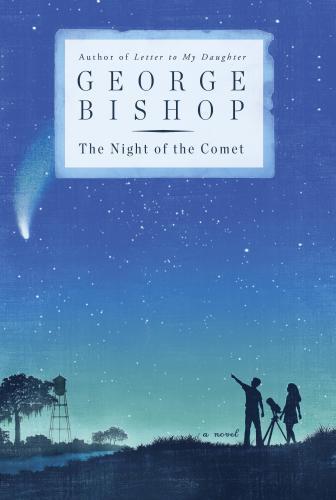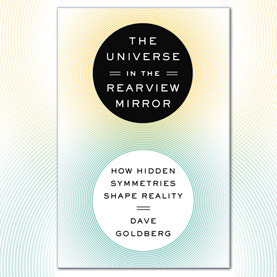Dropping Science: George Bishop and Dave Goldberg
The Night of the Comet by George Bishop
 Typically, when a book starts out bad, it tends to be altogether bad. It’s very rare–in my experience, anyway–that a book whose first 70 pages or so are crammed full of clichés and hackneyed writing manages to right itself by the end. And so I was pleasantly surprised by George Bishop’s The Night of the Comet, a coming-of-age story that comes dangerously close to collapsing under the weight of its own hokeyness.
Typically, when a book starts out bad, it tends to be altogether bad. It’s very rare–in my experience, anyway–that a book whose first 70 pages or so are crammed full of clichés and hackneyed writing manages to right itself by the end. And so I was pleasantly surprised by George Bishop’s The Night of the Comet, a coming-of-age story that comes dangerously close to collapsing under the weight of its own hokeyness.
The book begins with our narrator Alan Broussard, Jr. receiving a telescope for his fourteenth birthday from his father, an astronomer-turned-high-school-science-teacher and all around geek. The elder Broussard’s hope is that he and his son might use the telescope to follow progress of Comet Kohoutek, with which the man is more than a little obsessed; he even convinces the mayor to host a viewing party in the town square. However, Junior uses the telescope to spy on his new neighbor Gabriella, whose well-to-do family has recently moved in across the inlet that separates the two families’ properties (Gatsby, anyone?). Meanwhile, the comet creates a divide between Junior’s father and mother, the latter of whom dreams of a more glamorous life and, to this effect, becomes infatuated with the new family across the water.
As a narrator, Alan, Jr. is …underwhelming, with his Bradyish sensibilities and his predictably wholesome devotion to his parents: I’ve never met a teenager who enjoyed the tale of when his parents first met as much as he does, so much so that he practically recites it by rote as his mother retells it upon request–but then maybe I just hung out with the wrong people when I was younger. The bigger issue is his voice, bland and toneless, not all that dissimilar from his father’s. This isn’t really a problem in terms of plot, but it doesn’t exactly make for a compelling read, either
The story ticks along in a predictable fashion–Alan, Jr. nervously pursues Gabriella, who is dating the class jock; Alan, Sr. tracks the comet with a mad scientist’s zeal; Mrs. Broussard, feeling neglected by her husband, grows distant and disenchanted with the marriage. Frankly, there’s nothing really new here; the whole thing feels dated and anachronistic, as if Bishop is writing about the kind of sugarcoated past the memory can’t help but conjure.
But then something happens, I don’t know how to explain it, the story shifts, the book takes on a new focus, or maybe it just hones its original focus. Somehow, Bishop steps out of the realm of cliché into a truly moving story about the realities of love, the cold truth about what “coming of age” actually entails. It’s interesting, partially because I’m not sure if its intentional, this shift, although I can’t say if that’s a point in its favor or not.
Frankly, though, I think the question of intent here is irrelevant; all that matters is what we’re left with, a flawed but charming tale about the blurry boundary between adolescence and adulthood. The Night of the Comet doesn’t execute a complete 180, but it’s enough to leave the reader feeling somewhat satisfied.
 The Universe in Our Rearview Mirror: How Hidden Symmetries Shape Reality by Dave Goldberg
The Universe in Our Rearview Mirror: How Hidden Symmetries Shape Reality by Dave Goldberg
I saw The Matrix on a rainy Easter Sunday, close to midnight, in 1999. I was with my friend Brad, both of us high school students at the time, a year from graduating and aching to escape our prim little Louisiana town. After the movie, we went to a nearby Waffle House and, over cigarettes and burned coffee, discussed the movie with the flighty acumen you’d expect from folks our age; we talked about time and reality, whether or not God exists. We said things like “If we can’t even know if God is real, how do we know if, like, we’re real or whatever?” I cringe now think of this conversation. To the people sitting nearby, we must have sounded asinine, but we didn’t care; the movie had gotten us into a philosophical fervor, and at that moment talking through these questions seemed like the most important thing in the world (I also wasn’t getting laid back then, in case it wasn’t already obvious).
It’s these kinds of questions that form the foundation of Dave Goldberg’s latest book The Universe in Our Rearview Mirror: How Hidden Symmetries Shape Reality. Advertising itself as a stoner’s guide to physics, the book addresses such topics as relativity, quantum mechanics, black holes, antimatter, and the philosophy of time, all through a somewhat sarcastic lens of pop culture. Goldberg’s interest in these topics is the presence of symmetry–the tendency, for instance, for particles to “spin” in tandem with their counterparts, or the balancing effect of matter and antimatter. The writing is thorough but accessible, employing enough real-world analogies for the laypersons among us to grasp some of these weighty concepts.
Goldberg does have a habit of getting sidetracked, making it tricky at times to follow him; each chapter seems to meander through a series of semi-related ideas before revealing an actual focus, which, for folks like me who are baffled by any physics concept more complicated than Newton’s falling apple, can be frustrating. There’s also his constant interjections of self-deprecating humor, which get a little predictable and sometimes come across as snotty; Goldberg himself refers to the kinds of hypotheses he’s addressing as “stoner questions” and gets in a couple jabs at the Twilight series. Hardly a crime, I know, but it’s like, of course he would rag on Twilight, it’s sort of the whipping boy of anyone afraid of being taken too seriously–it’s just so easy, you know?
The point being, I suppose, that Goldberg’s aim here–elucidating the mysteries of the physical world in the context of symmetry–is noble, but his attempts at teenager-ish irony undermine this in a way that doesn’t make the material any more easy to understand and, at times, is just downright annoying.
All the same, it’s a quick and interesting read, more or less fun, especially if you’ve ever sat in a Waffle House at 2 AM and waxed philosophically with fellow losers. I think the real purpose here isn’t to explain these concepts but to give credence to those lofty, abstract questions that drift into our minds from time to time. And I think that’s a good thing, helping us to recognize that “stoner questions” are kinda what physics is all about–I just wish Goldberg could have found a slightly less insulting way to phrase it.





